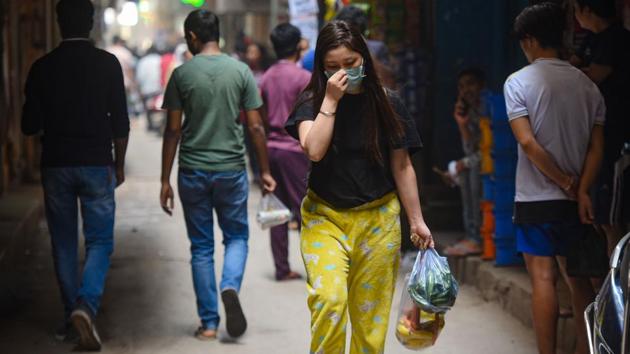In some cheer, 100,000 Covid-19 infected patients recover across the world
After three Covid-19 cases in Kerala made complete recovery in February, the second wave of recovery has begun in India with 11 of the 14 Italians diagnosed with Covid-19 cases in the country on March 4 leaving the isolation ward in Medanta-The Medicity in Gurugram, taking the total number of those cured in the country to 33.
The number of people who have recovered from coronavirus disease (Covid-19) globally crossed 100,000 on Monday and provided a flicker of hope among the doom and gloom enveloping the world, where at least 350,000 people have been infected and 15,000 have died of the infection in 192 countries and territories.

After three Covid-19 cases in Kerala made complete recovery in February, the second wave of recovery has begun in India with 11 of the 14 Italians diagnosed with Covid-19 cases in the country on March 4 leaving the isolation ward in Medanta-The Medicity in Gurugram, taking the total number of those cured in the country to 33.
“Patients are declared recovered if they have no fever without medication for three days, have no symptoms of coughing and shortness of breath for a full week after the symptoms first appeared, and test negative for Covid-19 tests on two consecutive days, and only then are they allowed to leave isolation and resume contact with other people,” said Dr Yatin Mehta, chairman, Medanta Institute of Critical Care and Anaesthesiology, Medanta-The Medicity.
Two consecutive negative tests are needed because the virus may persist in the body for days after symptoms disappear, with critically ill Covid-19 patients reporting symptoms even 24 days later. A small study of four physicians in China found the virus in the body after two weeks, while new research from Germany, which is yet to be peer-reviewed, found that people with mild symptoms become non-infective around 10 days after they get infected. The longest Sars-Cov-2, the virus that causes Covid-19, has survived in the human body is for 37 days in the respiratory tract of a man in China, reported the scientific journal The Lancet last week.
Going by the global estimation of cases, the mortality rate of Covid-19 is around 4.3%, since this figure is calculated by dividing the deaths by the number officially confirmed cases, it is likely to be high as many mild cases are being missed, which would bring down the death rate significantly. Four in five people infected with Sars-Cov-2 develop mild illness and recover in about two weeks, but those with more severe infection may take between three and six weeks to rebound, according to the World Health Organization. Data from the US and China shows that the disease causes varying degrees of illness in adults and older persons, who need intensive care with ventilator support for severe acute respiratory infections such as pneumonia.
“We discharged patients from isolation ward only after they test negative twice for Covid-19 after a gap of two to three days, to rule out false negative test results, which may occur when the viral load is very low and the patient is no longer infective,” said Dr Naresh Trehan, chairman, Medanta-The Medicity.
Coronavirus patients may suffer from reduced lung capacity following a bout of the disease, with the Hong Kong Hospital Authority reporting that two in three people lost 20-30% lung function, but there is no data from India yet since the number with severe disease is relatively small. “Social isolation and strict containment measures help contain the spread of the disease, which is also spread by infected people with mild or no symptoms. China on Monday reported only imported cases of Covid-19, and demonstrated that infection control measures in isolation ward and social isolation via strict travel curbs are critical to stopping local transmission,” said a public health expert, requesting anonymity.
How long do patients who have no symptoms remain infective?
Those with mild symptoms are usually not infective 10 days after getting symptoms, according to provisional findings of a study from Germany, which is among the first outside China to look at clinical data from Covid-19 patients. The study also found that people with Covid-19 release high amounts of virus in aerosol droplets while coughing within days of getting infected, which explains how the rapid global spread of infection within three months of a novel coronavirus being identified from Wuhan in China, the epicentre of the pandemic.
But does getting Covid-19 make one immune to the disease for life? Or does it provide protection for some time, waning over time?
Reports from Japan in February of a woman in her 40s testing positive for Covid-19 a second time after being discharged from hospital in Osaka have fuelled fear of reinfection, but epidemiologists and communicable disease experts say it is unlikely.
“Vaccine development is possible because antibodies are able to protect against infection, we need an antibody response for the vaccine to be active at all. The Covid-19 test, RT-PCR, is highly sensitive but it can throw up a false negative if the swab sample is, say, being taken from the throat when the infection is in the lungs,” said Dr Lalit Kant, former head of epidemiology and communicable disease, Indian Council of Medical Research.
“So if infection is indeed happening there is no point in developing a vaccine. We know from earlier coronaviruses infections like Severe Acute Respiratory Syndrome that the disease gives short-lived immunity up to three years, but we don’t have enough information about the new virus to make a prediction,” he said.
India on Monday approved anti-malarial drug hydroxychloroquine for preventive care for close family contacts and healthworkers treating Covid-19 cases.
Get Current Updates on India News, Lok Sabha Election 2024 live, Infosys Q4 Results Live, Elections 2024, Election 2024 Date along with Latest News and Top Headlines from India and around the world.




